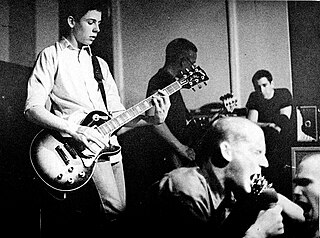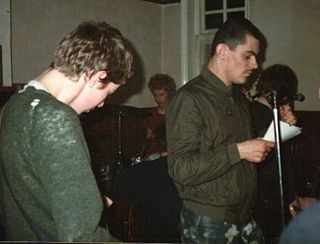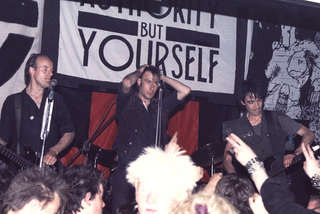Propaganda is a form of communication that is aimed at influencing the attitude of a community toward some cause or position.
Contents
Propaganda may also refer to:
Propaganda is a form of communication that is aimed at influencing the attitude of a community toward some cause or position.
Propaganda may also refer to:

Minor Threat was an American hardcore punk band, formed in 1980 in Washington, D.C., by vocalist Ian MacKaye and drummer Jeff Nelson. MacKaye and Nelson had played in several other bands together, and recruited bassist Brian Baker and guitarist Lyle Preslar to form Minor Threat. They added a fifth member, Steve Hansgen, in 1982, playing bass, while Baker switched to second guitar.
Psychobilly is a rock music fusion genre that fuses elements of rockabilly and punk rock. It's been defined as "loud frantic rockabilly music", it has also been said that it "takes the traditional countrified rock style known as rockabilly, ramp[ing] up its speed to a sweaty pace, and combin[ing] it with punk rock and imagery lifted from horror films and late-night sci-fi schlock,... [creating a] gritty honky tonk punk rock."
Maximumrocknroll, often written as Maximum Rocknroll and usually abbreviated as MRR, is a not-for-profit monthly online zine of punk subculture and radio show of punk music. Based in San Francisco, MRR focuses on punk rock and hardcore music, and primarily features artist interviews and music reviews. Op/ed columns and news roundups are regular features as well, including submissions from international contributors. By 1990, it "had become the de facto bible of the scene". MRR is considered to be one of the most important zines in punk, not only because of its wide-ranging coverage, but because it has been a consistent and influential presence in the ever-changing punk community for over three decades. From 1992 to 2011, it published a guide called Book Your Own Fuckin' Life.
Orange Juice were a Scottish jangle pop band founded in the Glasgow suburb of Bearsden as the Nu-Sonics in 1976. They became Orange Juice in 1979, and became perhaps the most important band in the Scottish independent music scene that emerged in the post-punk era, inspired by contemporary punk bands including Subway Sect, Television, and Buzzcocks but also 1960s acts, most notably the Byrds and the Velvet Underground. Musically, the band brought together styles and genres that often appeared incongruous, for example, country, disco and punk.

Punk ideologies are a group of varied social and political beliefs associated with the punk subculture and punk rock. It is primarily concerned with concepts such as mutual aid, against selling out, hierarchy, white supremacy, authoritarianism, eugenics, class and classism, while supporting anti-consumerism, anti-corporatism, anti-war, anti-imperialism, leftism, anti-globalization, anti-gentrification, anti-racism, anti-sexism, gender equality, anti-homophobia, racial equality, animal rights, free-thought and non-conformity. One of its main tenets is a rejection of mainstream, corporate mass culture and its values. It continues to evolve its ideology as the movement spreads throughout North America from its origins in England and New York and embraces a range of anti-racist and anti-sexist belief systems. Punk does not necessarily lend itself to any particular political ideology as it is primarily anti-establishment although leftist punk is more common due to the prevalence of liberal and conservative ideologies in the status-quo.
Flux of Pink Indians was an English punk rock band from Bishop's Stortford, Hertfordshire, England, active between 1980 and 1986.
Serbian rock is the rock music scene of Serbia. During the 1960s, 1970s and the 1980s, while Serbia was a constituent republic of Socialist Federal Republic of Yugoslavia, Serbian rock scene was a part of the SFR Yugoslav rock scene.
New wave in Yugoslavia was the new wave music scene of the Socialist Federal Republic of Yugoslavia. As its counterparts, the British and the American new wave, from which the main influences came, the Yugoslav scene was also closely related to punk rock, ska, reggae, 2 tone, power pop and mod revival. Some of its acts are also counted as belonging to the Yugoslav punk scene which already existed prior to new wave. Such artists were labeled as both punk rock and new wave.

The Apostles are an English experimental punk rock band, who developed within the confines of the 1980s anarcho-punk scene in the UK, but did not necessarily adhere to the aesthetics of that movement.

Idoli were a Serbian new wave band from Belgrade. They are considered to be one of the most notable acts of the Yugoslav rock scene, and their 1982 album Odbrana i poslednji dani was on several occasions voted by the music critics as the greatest Yugoslav rock album.
The mod revival is a subculture that started in the United Kingdom in the late 1970s and later spread to other countries.

Kaaos was a Finnish hardcore punk band from Tampere, Finland. Formed in March 1980, they were one of the first hardcore punk bands in Finland to release a record. Though their lineup has changed frequently through the years, the band is somewhat active through the years. Only the band's guitarist Jakke remained as the original member and grew to become the center figure of Kaaos.

The history of the punk subculture involves the history of punk rock, the history of various punk ideologies, punk fashion, punk visual art, punk literature, dance, and punk film. Since emerging in the United States, the United Kingdom and Australia in the mid-1970s, the punk subculture has spread around the globe and evolved into a number of different forms. The history of punk plays an important part in the history of subcultures in the 20th century.

Crass were an English art collective and punk rock band formed in Epping, Essex in 1977, who promoted anarchism as a political ideology, a way of life, and a resistance movement. Crass popularised the anarcho-punk movement of the punk subculture, advocating direct action, animal rights, feminism, anti-fascism, and environmentalism. The band used and advocated a DIY ethic in its albums, sound collages, leaflets, and films.
German punk includes a body of music and a subculture that have evolved since punk rock became popular in Germany in the 1970s. Within the subculture of punk in Germany, a style of music called Deutschpunk was developed; this style of music has developed distinctly from hardcore punk, and includes lyrics in German as well as a fast tempo. In the punk scene in Germany, some bands play music in the Deutschpunk style, while other German punk bands pursue various other styles of punk music.

Zana is a Serbian and Yugoslav rock and pop group formed in Belgrade in 1979.
Punk rock in Yugoslavia was the punk subculture of the former Socialist Federal Republic of Yugoslavia. The most developed scenes across the federation existed in the Socialist Republic of Slovenia, the Adriatic coast of the Socialist Republic of Croatia, the Socialist Autonomous Province of Vojvodina and Belgrade, the capital of both Yugoslavia and the Socialist Republic of Serbia. Some notable acts included: Pankrti, Paraf, Pekinška patka, KUD Idijoti, Niet, Patareni and KBO!.
Popular music in Yugoslavia includes the pop and rock music of the former SFR Yugoslavia, including all their genres and subgenres. The scene included the constituent republics: SR Slovenia, SR Croatia, SR Bosnia and Herzegovina, SR Montenegro, SR Macedonia and SR Serbia and its subunits: SAP Vojvodina and SAP Kosovo. The pop and rock scene was a part of the general Music of Yugoslavia, which also included folk, classical music, jazz etc. Within Yugoslavia and internationally, the phrases ex-YU or ex-Yugoslav Pop and Rock both formally and informally generally to the SFRY period, though in some cases also to its successor the FR Yugoslavia including Serbia and Montenegro which existed until 2006.
Propaganda was a Yugoslav new wave band formed in Belgrade in 1981. Formed by former Zvuk Ulice and Bulevar members, Propaganda released only one album, Apatija javnosti, and disbanded. After the group ended its activity, Propaganda guitarist and vocalist Kokan Popović continued his career with the band Idoli, where he was soon joined by Propaganda bass guitarist Branko Isaković. Despite being short-lived, Propaganda was a prominent act of the Yugoslav new wave scene.
Propaganda Records company and Propaganda label are an independent Finnish record company and a record label established in 1981. Since the beginning Helsinki-based Propaganda specialized in independent punk music and hardcore. The label dominated the Finnish hardcore punk and underground scene from the early 1980s until 1986. Releases were soon distributed in West Germany, Brazil and the United States. They soon began reissues in West Germany.